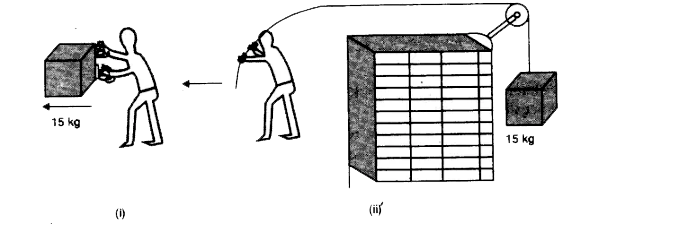The casing of a rocket in flight burns up due to friction . At whose expense is the heat energy required for burning obtained ? The rocket or the atmosphere ?
The total energy of a rocket in a flight depends on its mass i.e., P.E + K.E = mgh + 12mv2 . When the casing burns up, its mass decreases. The total energy of the rocket decreases Hence heat energy required for burning is obtainea from the rocket itself and not form the at mosonere
Similar Questions
Answer the following:
a) The casing of a rocket in flight burns up due to friction. At whose expense is the heat required for burning obtained? The rocket or the atmosphere?
b) Comets move around the sun in highly elliptical orbits. The gravitational force on the comet due to the sun is not normal to the comet's velocity in general. Yet the work done by the gravitatonal force over every complete orbit of the comet is zero. Why?
c) An artificial satellite orbiting the earth in very atmosphere loses its energy grdually due to dissipation against atmospheric resistance, howerver small. Why then does its speed increase progressively as it comes closer and closer tothe earth? d)In fig i) the man walks 2m carrying a mass of 15 kg on his hands. In Fig ii) he walks the same distance pulling the rope behind him. The rope goes over pulley, and a mass of 15 kg hangs at its other end. In which case is the work done greater?

View SolutionAnswer the following:
a) The casing of a rocket in flight burns up due to friction. At whose expense is the heat required for burning obtained? The rocket or the atmosphere?
b) Comets move around the sun in highly elliptical orbits. The gravitational force on the comet due to the sun is not normal to the comet's velocity in general. Yet the work done by the gravitatonal force over every complete orbit of the comet is zero. Why?
c) An artificial satellite orbiting the earth in very atmosphere loses its energy grdually due to dissipation against atmospheric resistance, howerver small. Why then does its speed increase progressively as it comes closer and closer tothe earth? d)In fig i) the man walks 2m carrying a mass of 15 kg on his hands. In Fig ii) he walks the same distance pulling the rope behind him. The rope goes over pulley, and a mass of 15 kg hangs at its other end. In which case is the work done greater?

View Solution
Knowledge Check
During a journey from earth to the moon and back the greatest energy required for the space ship rocket is over come
Athe earth's gravity at take offBthe moon's gravity at lunar landingCthe moon's gravity at lunar take offDthe force at the point where the pull of the earth and moon are equal and oppositeIn these questions, the 1st and The last sentence of the passage are numbered 1 and 6. The rest of the passage is split into four parts and named P, Q, R and S. These four parts are not given in their proper order. Read the sentences and find out which of the four combinations is correct.
1. A rocket burns a fuel that makes a great deal of gas at the back of the rocket.
P. Ordinary fuel will burn only in air, because it needs the oxygen in the air.
Q. A rocket can therefore travel outside the atmosphere in space where there is no air.
R. This gas pushes against the rocket and sends it forward.
S. However, rocket fuels have their oxygen in them and so they burn without air.
6. In fact, it will travel faster in space than in the air because the friction of the air is not there to slow it down.AQSRPBRPSQCSQPRDPRQSMeteorites burn up in the mesophere but not in the thermosphere. It is due to
Arelatively thicker atmosphere in the mesophere.Brelatively thicker atmosphere in the theremosphere.Cvery low temperatures in the mesophere.Dvery low temperatures in the themosphere.
………………. Is used for burning fuel in the rockets and space ships.
View Solution………………. Is used for burning fuel in the rockets and space ships.
View SolutionIntext Question.
Take two convex lenses of different sizes. Collect sunlight on a paper using one of the lenses. The paper will start burning after a while. Note the time required for the paper to start burning. Repeat the process for the second lens. Is the time required the same in both cases? What can you tell from this?
View SolutionRocket in flight is not an illustration of projectle .
Rocket takes flight due to combustion of fuet and does not move undr the graveity effect alone.
View SolutionMeteorites burn up in the mesophere but not in the thermosphere. It is due to
View Solution
